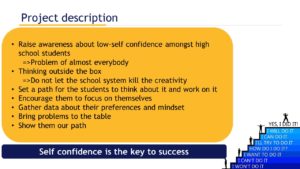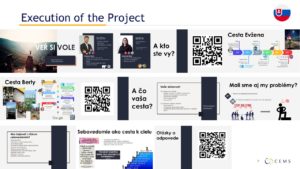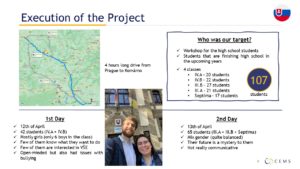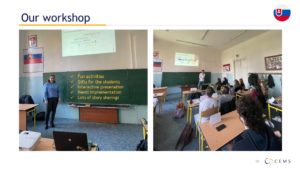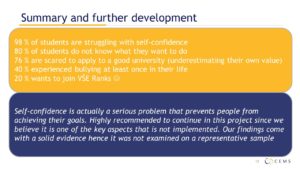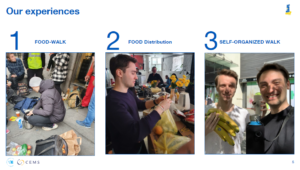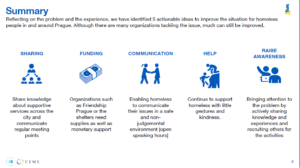CEMS Students Raise Awareness in Various Areas of Social Responsibility by Implementing their CSR in Practice Projects
CSR in Practice is a compulsory course within the CEMS VSE curriculum focused on acquiring hands-on experiences in the field of social responsibility. This academic year students came up with projects covering problems of homelessness, self-esteem at high schools, as well as very up-to-date and needed help for Ukrainian refugees currently staying in the Czech Republic.
Moreover, as with almost every course within the CEMS curriculum, students not only designed various solutions for emerging CSR problems but they directly implemented some of their ideas into practice causing an immediate response from their peers as well as the general public.
Down below you may find an overview of projects that resonated the most with us.
Project self-esteem on high schools
Students Evžen Balomenos and Berta Šimonová decided to aim their efforts on the mental health and low self-esteem of high-schoolers. They build the project on assumption that low self-confidence leads to giving up on goals and unnecessary failures. In their project, they then aimed to set a path for the students to think about it and work on it and encourage them to focus on themselves. To do so, they used their own high-school experience to inspire others. For the execution of their project, they chose Gymnázium Ľudovíta Jaroslava Šuleka, a high school in Komárno, Slovakia, where they held an extensive motivational workshop.
Homelessness and partnering with the Friendship in Prague NGO
Peter Bogdanov and Magnus Lütt identified homelessness as a major problem in urban areas. The affected often do not receive the necessary support in terms of food, shelter or possibilities to build human connections. Peter and Magnus, therefore, decided to team up with a social initiative FriendShip Prague and set up to meet homeless people in the city centre of Prague and deliver
various foods and non-alcoholic beverages, as well as raise awareness about homelessness and generally, share positive experiences.
Reflecting on the problem and their own experience, they then identified 5 actionable ideas to improve the situation for the homeless. They also state that although there are many organizations tackling the issue, much can still be improved. As their key finding, they say: “We mainly learned that in order to have a social impact you simply need to start ‘doing’.”
Free educational help to Ukrainian children refugees
The team of Lizaveta Bykava, David Lora and Egor Demtsev decided to tackle one of the most current issues – the situation around Ukrainian refugees in the Czech Republic. In their project, they aimed to provide free educational help to Ukrainian children refugees in partnership with ScioŠkola. The specific activities they then undertook were assistance in admission procedure, playing indoor/outdoor games with the children, helping with ideas for Ukrainian language lessons, and they also taught the children basic self-introduction and animals in English and Spanish.
Lizaveta together with another CEMS VŠE student Lukáš Pivarník and four CEMSies from the Corvinus University of Budapest and The London School of Economics and Political Science implemented the goal to help Ukrainian refugees also into their cross-border Business Project with Google, where they concentrated on “How Google Czechia can support Ukrainian Refugees in The Czech Republic”. Based on extensive analysis, they presented recommendations on specific initiatives for Google Czechia that could effectively address refugee needs while leveraging its core capabilities and the existing support network. The recommendations were to:
- Facilitate access to essential information for refugees.
- Partner with a network of coordinated aid.
- Develop 4 free Czech language courses on Coursera.
- Connect refugees with job board providers.
- Develop a digital mentoring platform.
- Empowering Ukrainian refugee women in Tech.
- Enrich the entrepreneurship potential of the Ukrainian refugees.
